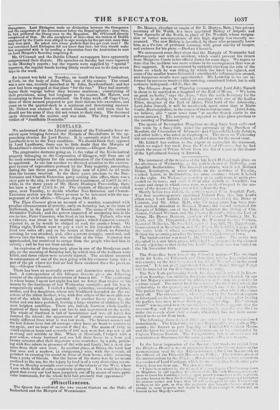SCOTLAND.
We understand that the Liberal students of the University have re- solved upon bringing forward the Marquis of Breadalbane at the ap- proaching election for Lord Rector. It is currently stated that Lord Lyndhurst is to be the Tory candidate. We should think that, opposed by Lord Lyndhurst, there can be little doubt that the Marquis of Breadalbane s election will be tolerably secure.—Glasgow Argus.
The progressive decrease going on in the value of the Ecclesiastical property belonging to the Corporation of Glasgow, will form one of the most serious subjects for the consideration of the Council about to be appointed. In our last number we directed attention to the extrava- gant system of expenditure pursued by the Tory majority, amounting, during the last three years, to the large sum of 4,296/. 58. 4d. more than the income received. In the three years previous to the Non- Intrusion and Church- Extension party coining into office, there was a clear gain to the city, in the Ecclesiastical department, of 1,087/. 2s. 5.d. ; while, in the three years of Mr. Henry Dunlop's Provostship, there has been a loss of 1,7411. Sc. 2d. The electors of Glasgow are called upon, next Tuesday, to decide whether Non-Intrusion and Church- Extension zealots are the fittest persons to be intrusted with the ma- nagement of civic affairs.-- Glasgow Argus, Oct. 29.
The Elgin Courant gives an account of a murder,•committed with peculiar circumstances of atrocity, early on Saturday last, at the burn of Ballintomb, in the parish of Knockando, The name of the victim is Alexander Tulloch; and the person suspected of murdering hint is his son.in-law, Peter Cameron, who lived in his house. Tulloch, who was a widower, was about to be married again ; which Cameron strongly objected to, as he would be obliged to seek for another home. On Friday night, Tulloch went to pay a visit to his intended wife, who lived two miles off ; and on his return at three o'clock on Saturday morning, he was attacked, and, after a severe struggle, murdered, and into nto the burn, which was swollen at the time. Cameron was apprehended, but contrived to escape from the people who had him in custody ; and he has not been retaken.
An explosion of fire-damp took place in one of the Dundyvan coal- pits, on the morning of Saturday last, by which two of the workers were killed, and three others were severely injured. The accident occurred in consequence of one of the men going with his common lamp into a part of the pit where the foul air had been confined from the previous day.— Glasgow Chronicle.
There has been an unusually severe and destructive storm in Scot- land. A correspondent of the Glasgow Ga:ctte gives the following account of the calamitous destruction of human life. The f:eatleinau in whose house I spent last night has lost no fewer than twelve of his tenants by the hurricane of last Wednesday sennight ; and his loss is comparatively small. I visited a family yesterday, consisting of father, mother, and five daughters, whose sole livelihood depended on the ex- ertions of the eldest brother, who, with five others of the most able sea- men of' the whole island, perished. In another house close by, the father and son have perished, leaving a large number of children in the most helpless condition. There are, indeed, fourteen whole families deprived of their heads, and cast lonely and unprotected on the world. The whole of Shetland is full of lamentation and wo ; all mirth has deserted the island; the appearance of almost every countenance is totally different front what it was last week. The bravest seamen and the best fishers have lost all courage—they have no heart to venture to sea again, and no hope of success if they do. The storm of 1832, in which eighteen boats and upwards of 100 men were lost, was not at all SO strong and terrible as this. When at Mosshank, I lodged with a poor widow, whose husband and son left their house in a boat, and twenty minutes after their departure were overtaken by a gale, perish- ing with five others in presence of thd wife and family, hut a short dis- tance from their own door. Imt another place, at Iluxta, the laird had four sons and a nephew, (a clergyman,) who, with the servant, all perished in crossing the sound in front of their house, while returning from a party of friends. But the havoc of the storm was by no means confined to the sea, for the injury by land is of a very distressing nature. I was on Monday sennight over some of the islands of the West, where I saw whole fields of corn completely destroyed. You would have ima- gined that every ear had been purposely cut off by means of some parti- cular instrument, for the whole field haul precisely that appearance."


























 Previous page
Previous page